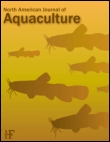
NORTH AMERICAN JOURNAL OF AQUACULTURE
Scope & Guideline
Empowering aquatic ecosystems through impactful research.
Introduction
Aims and Scopes
- Aquaculture Nutrition and Feed Development:
Research focusing on dietary formulations, feed additives, and alternative protein sources that enhance growth, health, and survival rates of various aquatic species. - Aquaculture Systems and Management:
Studies on the design, optimization, and management of aquaculture systems, including recirculating aquaculture systems (RAS) and biofloc technology. - Fish Health and Disease Management:
Investigations into the health of cultured species, including disease resistance, vaccination strategies, and the effects of environmental stressors on fish health. - Breeding and Genetics:
Research on genetic improvement, breeding techniques, and the genetic diversity of aquaculture species to enhance growth performance and disease resistance. - Environmental and Ecological Impacts:
Studies assessing the ecological effects of aquaculture practices on local ecosystems, water quality, and fish populations. - Innovative Technologies in Aquaculture:
Explorations of new methodologies, technologies, and practices that improve aquaculture efficiency, sustainability, and productivity.
Trending and Emerging
- Sustainable Feed Alternatives:
A growing trend towards researching plant-based and alternative protein sources for fish feed, aiming to reduce reliance on fish meal and enhance the sustainability of aquaculture. - Probiotics and Microbiome Studies:
Increased focus on the role of probiotics and the gut microbiome in enhancing fish health, growth performance, and disease resistance, indicating a shift towards more holistic management practices. - Impact of Environmental Variables:
Research increasingly examines how environmental factors such as temperature, salinity, and water quality affect aquatic species, reflecting a need for adaptive management strategies in aquaculture. - Genetic and Genomic Approaches:
Emerging studies utilizing genetic tools and genomic technologies to improve breeding programs and understand the genetic basis of traits related to growth and disease resistance. - Aquaculture in Changing Climate Conditions:
An increased emphasis on understanding how climate change impacts aquaculture, leading to research on adaptive practices and species selection for future resilience.
Declining or Waning
- Traditional Aquaculture Practices:
There appears to be a decreasing focus on conventional aquaculture methods as researchers increasingly explore innovative technologies and practices that offer sustainability and efficiency. - Wild Fish Stocking and Harvesting Techniques:
Research related to traditional practices of stocking and harvesting from natural fish populations has diminished as the emphasis shifts towards sustainable aquaculture systems and species conservation. - Basic Aquatic Biology of Non-Cultured Species:
Studies centered on the biology of wild aquatic species, rather than those directly involved in aquaculture, are becoming less frequent, indicating a shift towards more applied research that directly benefits aquaculture.
Similar Journals
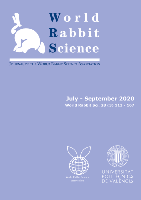
World Rabbit Science
Advancing rabbit science for a sustainable future.World Rabbit Science, published by Universitat Politècnica de València, Editorial UPV, is a prominent open-access journal dedicated to the field of animal science and zoology, with a particular focus on the study and advancement of rabbit husbandry, physiology, and health. Since its inception in 1993, the journal has become a vital resource, contributing significantly to the global dialogue surrounding rabbit production and welfare. With an impact factor reflecting its respectable position in the academic community, the journal has established itself within the Q3 category in Animal Science and Zoology as of 2023, ranking 288 out of 490 journals according to Scopus metrics. World Rabbit Science aims to foster the dissemination of high-quality research, promote collaboration across disciplines, and support students, researchers, and industry professionals in their quest for innovative solutions within the rabbit production sector. As it converges into 2024, the journal continues to uphold its mission, serving as a crucial platform for disseminating knowledge and advancing the scientific understanding of this important area in agriculture.
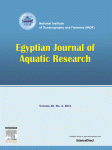
Egyptian Journal of Aquatic Research
Connecting researchers to elevate aquatic understanding.Welcome to the Egyptian Journal of Aquatic Research, a premier peer-reviewed academic journal published by ELSEVIER, dedicated to advancing the field of aquatic sciences. With a robust impact factor and recognition as a Q1 journal in key categories such as Aquatic Science and Ecology, this open access journal has established itself as a vital platform for disseminating high-quality research since its inception in 2012. The journal aims to provide comprehensive coverage of topics including ecology, evolutionary biology, and water science, making it a crucial resource for researchers, professionals, and students engaged in these dynamic fields. With Scopus rankings placing it in the top echelons of various categories, the Egyptian Journal of Aquatic Research fosters innovation, collaboration, and knowledge dissemination on a global scale, making it an indispensable asset for anyone invested in understanding and preserving aquatic systems.

ISRAELI JOURNAL OF AQUACULTURE-BAMIDGEH
Pioneering research for sustainable aquatic farming solutions.Welcome to the Israeli Journal of Aquaculture-Bamidgeh, published by AquacultureHub Inc, a pivotal platform dedicated to advancing the field of aquaculture studies since its inception in 1988. With a focus on innovative research and practical applications within the realms of Agronomy and Aquatic Sciences, this journal has established a reputation for disseminating high-quality findings that contribute to sustainable practices in aquatic farming. The journal, although classified in the Q3 and Q4 quartiles for its respective categories, offers valuable insights for researchers and practitioners alike, allowing them to stay abreast of developments in aquaculture challenges and solutions. While it's currently not an Open Access journal, the Israeli Journal of Aquaculture-Bamidgeh is committed to providing a thorough avenue for scholarly exchange and fostering collaborations across the global aquaculture community. Explore impactful studies and the latest trends to enhance your knowledge and research in this vital sector.
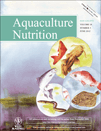
AQUACULTURE NUTRITION
Nurturing knowledge for healthier aquatic ecosystems.Aquaculture Nutrition is a leading peer-reviewed journal published by Wiley-Hindawi, dedicated to advancing the field of aquatic sciences through high-quality research on nutritional physiology and feed management in aquaculture species. Established in 1995, and with its converged years running until 2024, this journal has garnered a prestigious Q1 ranking in Aquatic Science, reflecting its significant impact and relevance as one of the top journals in the sector, evidenced by its 91st percentile ranking in the Scopus database for Agricultural and Biological Sciences. Aquaculture Nutrition provides an essential platform for researchers, professionals, and students to explore innovative methodologies, nutritional strategies, and species-specific dietary needs, fostering sustainability and productivity in aquaculture practices. While the journal offers a hybrid of open access and subscription-based content, it remains a critical resource for academics wishing to contribute to or stay abreast of advancements in aquatic nutrition research. With its strong focus on the intersection of aquaculture and nutritional science, Aquaculture Nutrition plays a vital role in addressing global food security challenges and promoting sustainable practices in the aquaculture industry.
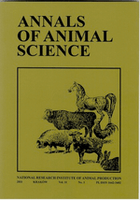
Annals of Animal Science
Unlocking Insights in Animal Science ResearchAnnals of Animal Science is a prestigious academic journal, published by Walter de Gruyter GmbH in Germany, specializing in the multifaceted field of Animal Science. With an ISSN of 1642-3402 and an E-ISSN of 2300-8733, this journal is recognized for its high-impact contributions, holding a commendable impact factor that demonstrates its relevance in nurturing quality research. The journal has garnered Q2 rankings in 2023 across various categories including Animal Science and Zoology, Food Animals, and Small Animals. Notably, its Scopus Rankings indicate an elite standing, with the journal placing in the top 10% within its specific fields. Covering converged years from 2008 to 2024, the Annals of Animal Science serves as an essential platform for researchers, professionals, and students to disseminate knowledge and advance studies related to animal health, welfare, and production. The journal also emphasizes open access, promoting broader accessibility to foster collaboration and innovation in Animal Science globally. For those committed to advancing their understanding of veterinary and agricultural sciences, this journal is a vital resource.

ICHTHYOLOGICAL RESEARCH
Transforming aquatic research into conservation action.Ichthyological Research is a prominent journal in the field of ichthyology, focusing on the biology, ecology, and conservation of fish species and their habitats. Published by Springer Japan KK, this journal has been a significant contributor to aquatic research since its inception in 1996 and will continue to disseminate cutting-edge findings through 2024. With an Impact Factor that places it within Q2 of the Ecology, Evolution, Behavior, and Systematics category, it ranks #318 out of 721 in Scopus, situating it in the 55th percentile of its field. This journal serves as a valuable resource for researchers, professionals, and students, offering open access to vital studies that drive forward our understanding of fish ecology and biodiversity. Located in Tokyo, Japan, Ichthyological Research aims to bridge gaps between theoretical research and practical application, emphasizing the conservation of aquatic ecosystems.

CZECH JOURNAL OF ANIMAL SCIENCE
Fostering Innovation in Zoological ResearchThe Czech Journal of Animal Science, published by the Czech Academy Agricultural Sciences, is a premier open-access journal dedicated to advancing research in the fields of animal science and zoology. With an impressive ranking of Q2 in its category for 2023, it underscores its significance within the academic community, evidenced by its Scopus rank of #197 out of 490 in Animal Science and Zoology, placing it in the 59th percentile among peers. The journal has been a crucial platform for scholarly communication since its inception and has embraced open access since 2004, ensuring that research is widely available to a global audience. Targeted toward researchers, professionals, and students, the journal publishes high-quality original research, review articles, and case studies that contribute to the understanding and enhancement of animal science practices. Its commitment to rigorous peer review and its broad scope undoubtedly solidify its role as an essential resource for those engaged in animal research and agriculture, fostering continued innovation and knowledge transfer in this vital sector.
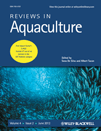
Reviews in Aquaculture
Empowering Aquaculture Through Cutting-Edge ResearchReviews in Aquaculture, published by Wiley, stands as a premier journal in the field of aquaculture and environmental science, dedicated to advancing knowledge and research on aquatic species and their management. Since its inception in 2009, the journal has built a robust reputation, achieving a remarkable Q1 ranking in prestigious categories including Aquatic Science, Ecology, and Management, Monitoring, Policy, and Law as of 2023. With a focus on delivering high-quality, peer-reviewed articles, it plays a critical role in disseminating innovative research and practical solutions to global challenges in aquaculture. Researchers, professionals, and students can navigate through the latest advancements in the field, gaining insights that are vital for sustainable practices and policy-making. The journal's impact is further highlighted by its exceptional Scopus rankings, placing it in the top percentile across various environmental and agricultural disciplines, making it an essential resource for those seeking to stay at the forefront of aquaculture research.

BOLETIM DO INSTITUTO DE PESCA
Fostering innovation in fisheries and aquatic ecosystems.BOLETIM DO INSTITUTO DE PESCA, published by the Instituto Pesca, is a Brazilian journal dedicated to advancing the fields of Animal Science and Aquatic Science. With its Open Access policy adopted in 2008, the journal ensures that research is widely disseminated, fostering collaboration and innovation among researchers, professionals, and students alike. Despite its recent Q4 category rankings in the 2023 metrics for both disciplines, the journal plays a vital role in providing a platform for emerging studies and critical discussions related to aquatic ecosystems and fisheries management. Covering a wide range of topics within its scope, BOLETIM DO INSTITUTO DE PESCA publishes original research, reviews, and case studies, stimulating academic dialogue and contributing to the sustainable management of aquatic resources in Brazil and beyond. This journal is an essential resource for anyone invested in marine and freshwater biology, ecology, and conservation.
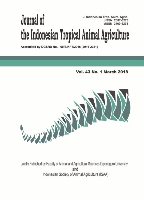
Journal of the Indonesian Tropical Animal Agriculture
Transforming Tropical Animal Agriculture through ResearchJournal of the Indonesian Tropical Animal Agriculture is an esteemed peer-reviewed journal published by UNIV DIPONEGORO, focusing on the dynamic fields of animal science and veterinary medicine. Since its inception in 2009, the journal has maintained an open access policy, ensuring that valuable research is freely available to the global scientific community. Based in Indonesia, the journal has adapted to the evolving agricultural landscape and now contributes significantly to both local and international discourse on tropical animal husbandry. With a Scopus rank placing it within the 36th percentile for general veterinary sciences and the 25th percentile for animal science and zoology, it is emerging as a valuable resource for researchers and professionals alike. The journal covers a broad range of topics within its scope, fostering innovative approaches and solutions tailored to the unique challenges of the tropical environment. By exploring critical issues in animal agriculture, this journal not only enhances academic knowledge but also supports sustainable practices within the industry. We invite researchers, students, and professionals in the realm of veterinary science and animal agriculture to engage with the rich array of research presented in this journal.